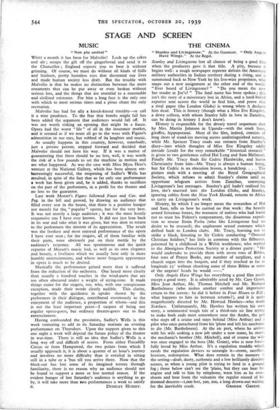STAGE AND SCREEN
MUSIC
4, Non piu andral " WHAT a month it has been for Malvolio! Lock up the cakes and ale ; scrape the gilt off the gingerbread and send it to the Chancellor ; England expects you to bear it without grinning. Of course, we must do without all kinds of frills and feathers, pretty harmless toys that decorated our lives and made human society less drab. But the trouble with Malvolio is that he makes no distinction between the mere ornaments that can be put away or even broken without serious loss, and the things that are essential to a reasonable and civilised existence. For him a long face is the only one with which to meet serious times and a pious chant the only recreation.
Malvolio has had for ally a knock-kneed timidity—or call
it a wise prudence. To the fear that bombs might fall has been added the argument that audiences would fall off. It was not worth risking an opening that might be a fiasco. Opera had the worst " life " of all in the insurance market, and it seemed as if we must all go to the wars with Figaro's admonition in our ears, but robbed of its laughter and music.
As usually happens in this country, however, somebody,
just a private person, stepped forward and decided that Malvolio should not have his way. If it was a matter of guaranteeing that there should be no loss, well, it was worth the risk of a few pounds to set the machine in motion and see what happened. As was the case with Miss Myra Hess's venture at the National Gallery, which has been almost em- barrassingly successful, the reopening of Sadler's Wells has resulted, in spite of the fact that so far only one performance a week has been given and, be it added, thanks to sacrifices on the part of the performers, in a profit for the theatre and no loss to the guarantor.
Last week Mozart's Figaro followed Faust and Cav, and rag. in the bill and proved, by drawing an audience that filled every seat in the house, that there is a positive hunger not merely for the, " popular " operas, but for the very best. It was not merely a large audience ; it was the most keenly responsive one I have ever known. It did not just lean back in its seat and take what it was given, but was alert to return to the performers the interest of its appreciation. The result was the freshest and most enjoyed performance of the opera I have ever seen ; for the singers, all of them familiar with their parts, were obviously put on their mettle by the audience's response. All was spontaneous and the quick repartee of Mozart's music had, as well as its own elegance grid beauty, a liveliness which we usually hear only in more humble entertainments, and whose more frequent appearance in opera is much to be desired.
Musically the performance gained more than it suffered from the reduction of the orchestra. One heard more clearly than usually a hundred touches in the wind-parts that are too often obscured under a weight of string-tone. It made things easier for the singers, too, who, with one conspicuous exception, made their words clearly audible. This clarity, together with the quickness in uptake shown by the performers in their dialogue, contributed enormously to the enjoyment of the audience, a proportion of whom—and this is not the least important point—I suspect of being not regular opera-goers, but ordinary theatre-goers out to find entertainment.
Having confounded the pessimists, Sadler's Wells is this week venturing to add to its Saturday matinee an evening performance on Thursdays. Upon the support given to this one night a week will depend the future policy of the theatre in war-time. There is still an idea that Sadler's Wells is a long way off and difficult of access. From either Piccadilly Circus or from Hampstead, the two points from which I usually approach it, it is about a quarter of an hour's journey and involves no more difficulty than is entailed in sitting still in a tube or a 'bus till you arrive there. Now that the black-out has lost some of its imagined terrors through familiarity, there is no reason why an audience should not be found to support a more or less normal season. If the evident hunger of last Saturday's audience is anything to go by, it will take more than two performances a week to satisfy












































 Previous page
Previous page